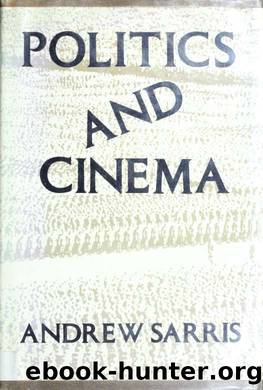Politics and cinema by Andrew Sarris

Author:Andrew Sarris [Sarris, Andrew]
Language: eng
Format: epub
Published: 1978-02-14T18:00:00+00:00
FASCINATING FASCISM
110
ties as well. By discrediting Riefenstahl as a human being, Sontag removes her from the center of any discussion of Triumph of the Will and Olympiad, and is free to discuss fascist art in a more generalized fashion. (Significantly, Riefenstahl is not mentioned in Sontag's own title for her essay, but is employed as a cover-teaser by The New York Review of Books). According to Sontag's argument, it is not Riefen-stahl's art that appeals to us still, but, rather, something fundamental in fascism itself: "the ideal of life as art, the cult of beauty, the fetishism of courage, the dissolution of alienation in ecstatic feelings of community; the repudiation of the intellect; the family of man (under the parenthood of leaders)."
Sontag then proceeds to amplify Walter Benjamin's dialectical distinctions between communist art ("Utopian morality") and fascist art ("Utopian aesthetics"), but she is too honest an observer of totalitarian mendacity not to report that the similarities between communist and fascist art outnumber and possibly even outweigh the differences. Perhaps, leaving well enough alone, she does not further complicate her argument by such anomalies of the Nazi era as Stalin's personal congratulations to Riefenstahl for Olympiad, and Dr. Goeb-bels' professed admiration for Potemkin and Mrs. Miniver. Also in her otherwise thorough account of Riefenstahl's filmmaking career, Son-tag neglects to mention Riefenstahl's collaboration on the script of The Blue Light (1932) with Bela Balasz, a left-wing screenwriter and film historian. Hitler admired The Blue Light, but so did the late Charles Chaplin, who arranged to have it play on a double bill with reissues of The Immigrant. Of course. Hitler's approval had more lasting consequences for Riefenstahl than Chaplin's. She obtained the opportunity to make Triumph of the Will, a careerist coup for a young woman filmmaker. Sontag finds it hard to believe that Riefenstahl could have had trouble with Goebbels when Hitler himself was so forthcoming. But it is hard to explain Riefenstahl's relative inactivity after Olympiad in any other way. It seems reasonable to assume that Hitler had other things on his mind besides advancing Riefenstahl's career past the bureaucratic roadblocks set up by Goebbels. More important, there is nothing in either Triumph of the Will or Olympiad that makes us see the Holocaust in all, or even any of its ultimate horror. Sontag herself concedes the absence of racism in Riefenstahl's conception of beauty. Unfortunately, there is a tendency to flatten out the historical perspective of the Nazi era so that
Download
This site does not store any files on its server. We only index and link to content provided by other sites. Please contact the content providers to delete copyright contents if any and email us, we'll remove relevant links or contents immediately.
Kathy Andrews Collection by Kathy Andrews(10506)
The remains of the day by Kazuo Ishiguro(7541)
Spare by Prince Harry The Duke of Sussex(4188)
Paper Towns by Green John(4163)
The Body: A Guide for Occupants by Bill Bryson(3789)
Be in a Treehouse by Pete Nelson(3206)
Harry Potter and the Goblet Of Fire by J.K. Rowling(3024)
Goodbye Paradise(2949)
Never by Ken Follett(2871)
Into Thin Air by Jon Krakauer(2695)
The Remains of the Day by Kazuo Ishiguro(2614)
The Genius of Japanese Carpentry by Azby Brown(2602)
The Cellar by Natasha Preston(2592)
Drawing Shortcuts: Developing Quick Drawing Skills Using Today's Technology by Leggitt Jim(2527)
120 Days of Sodom by Marquis de Sade(2428)
Architecture 101 by Nicole Bridge(2348)
The Man Who Died Twice by Richard Osman(2289)
Machine Learning at Scale with H2O by Gregory Keys | David Whiting(2263)
Fairy Tale by Stephen King(2058)
